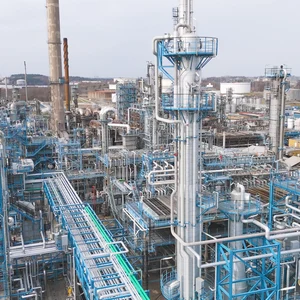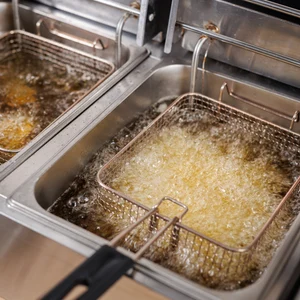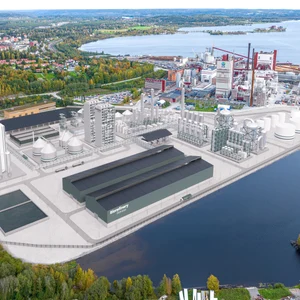Liquid Biofuels
What if the oil used to fry your food could fuel a plane?
Every day, millions of litres of used cooking oil are discarded — but at St1, we are giving this oil a new beginning. At our Gothenburg Biorefinery, used cooking oil, animal fats and tall oil are transformed into sustainable aviation fuel and renewable fuels that can cut emissions by up to 80% compared to fossil alternatives.
Biofuel production in Gothenburg
St1’s commitment to biofuel production
At St1, biofuel production is a key part of our strategy for reducing carbon emissions in transport and industry. The Gothenburg Biorefinery, located next to the St1 Refinery, has an annual production capacity of 200,000 tons of biofuels. The biorefinery is a joint venture between St1 and SCA, with St1 as the majority owner. The facility produces sustainable aviation fuel (SAF), renewable diesel (HVO), bio-naphtha, and bio-LPG, all certified according to the International Sustainability & Carbon Certification (ISCC) standard.

Flexible feedstocks for a sustainable future
Sourcing sustainable raw materials is essential for ensuring the long-term viability of biofuels. The Gothenburg Biorefinery is designed to process a variety of raw materials, including used cooking oil, fatty food waste and crude tall oil (CTO) fractions such as fatty acids - a by-product from kraft pulp production. To further secure supply chains, St1-owned Brocklesby Ltd, specialists in recycling food waste, has a crucial role in ensuring a reliable and sustainable feedstock supply.

Impact on emission reduction
By replacing fossil fuels with biofuels, the biorefinery contributes to a significant reduction in CO₂ emissions. The fuels produced at the facility are expected to lower emissions from road and air transport by approximately 500,000 tons of CO₂ annually compared to their fossil-based counterparts.

The future of biofuels: Biorefinery Östrand
St1 is developing Biorefinery Östrand, the world’s first large-scale biorefinery utilizing by-products from the Nordic forest industry and renewable power. This facility will have a production capacity exceeding 200,000 tons of biofuels and electrofuels.
This groundbreaking project is a collaboration between SCA and St1, bringing together two strong companies in a joint venture.
Illustration: Gatun Arkitekter

Liquid biofuels

Sustainable aviation fuel (SAF)

Renewable diesel (HVO)

Bionaphtha

bio-LPG
Advancing sustainable fuel solutions
St1 continues to innovate in the biofuel sector, developing new production technologies and expanding the use of sustainable raw materials. By integrating biofuels into transport and industry, we contribute to the energy transition.

